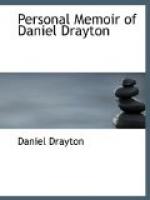The bearing, manner and aspect of the thirty-five armed persons by whom we had been thus seized and bound, without the slightest shadow of lawful authority, was sufficient to inspire a good deal of alarm. We had been lying quietly at anchor in a harbor of Maryland; and, although the owners of the slaves might have had a legal right to pursue and take them back, what warrant or authority had they for seizing us and our vessel? They could have brought none from the District of Columbia, whose officers had no jurisdiction or authority in Cornfield harbor; nor did they pretend to have any from the State of Maryland. Some of them showed a good deal of excitement, and evinced a disposition to proceed to lynch us at once. A man named Houver, who claimed as his property two of the boys passengers on board the Pearl, put me some questions in a very insolent tone; to which I replied, that I considered myself a prisoner, and did not wish to answer any questions; whereupon one of the bystanders, flourishing a dirk in my face, exclaimed, “If I was in his place, I’d put this through you!” At Piney Point, one of the company proposed to hang me up to the yard-arm, and make me confess; but the more influential of those on board were not ready for any such violence, though all were exceedingly anxious to get out of me the history of the expedition, and who my employers were. That I had employers, and persons of note too, was taken for granted on all hands; nor did I think it worth my while to contradict it, though I declined steadily to give any information on that point. Sayres and English very readily told all that they knew. English, especially, was in a great state of alarm, and cried most bitterly. I pitied him much, besides feeling some compunctions at getting him thus into difficulty; and, upon the representations which I made, that he came to Washington in perfect ignorance of the object of the expedition, he was finally untied. As Sayres was obliged to admit that he came to Washington to take away colored passengers, he was not regarded with so much favor. But it was evidently me whom they looked upon as the chief culprit, alone possessing a knowledge of the history and origin of the expedition, which they were so anxious to unravel. They accordingly went to work very artfully to worm this secret out of me. I was placed in charge of one Orme, a police-officer of Georgetown, whose manner towards me was such as to inspire me with a certain confidence in him; who, as it afterwards appeared from his testimony on the trial, carefully took minutes—but, as it proved, very confused and incorrect ones—of all that I said, hoping thus to secure something that might turn out to my disadvantage. Another person, with whom I had a good deal of conversation, and who was afterwards produced as a witness against me, was William H. Craig, in my opinion a much more conscientious person than Orme, who seemed to think that it was part of his duty, as a police-officer, to testify to something, at all hazards, to help on a conviction. But this is a subject to which I shall have occasion to return presently.




